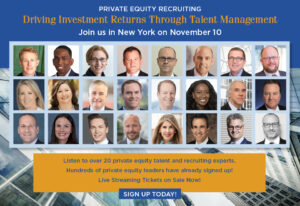LLR Partners Makes Equity Investment in True

May 25, 2021 – LLR Partners, a private equity firm based in Philadelphia, has made an investment in Haddonfield, NJ-based True, a global executive talent management platform. The new partnership is aimed at developing and expanding innovation within the talent space. Financial terms of the deal were not disclosed.
True surpassed $100 million in revenues in 2019 and added 146 people during the pandemic. True has consistently been the fastest organic growth mid-sized search firm over the last decade. Last month, True placed No. 7 on the Hunt Scanlon Media ‘Top 50 Recruiters’ ranking.
David Reuter, a partner at LLR, joins True’s board of directors alongside Nick Caldwell, vice president of engineering at Twitter; Jennifer Ceran, CFO of Smartsheet; Alex Shootman, CEO of Adobe company platform Workfront; and Evan Wittenberg, EVP and chief people officer at Ancestry. Following the minority stake investment, True co-founders Brad Stadler and Joe Riggione will continue to lead the firm with support and guidance from its board. True’s valuation was said to have been an outlier, reflecting the private equity firm’s belief that True has the potential to become one of the most significant brands in the executive talent sector. Notably, the deal is structured to grant employee participation in value creation over time.
LLR Partners, which has raised more than $5 billion to fund investments across the technology and healthcare sectors, is said to have bought into True’s mission: to disrupt a stagnant industry in desperate need of tech-driven talent solutions.
“They expressed interest and we were compelled to listen,” said Brad Stadler, True co-founder and co-CEO, “even though we were not looking for a financial partner. “Through our discussions, we quickly became aligned on how they could operationally and strategically support our long-term vision.”
“We also aligned on our ability to control our own destiny with no pressure to transact, said Joe Riggione, True co-founder and co-CEO. “Our collective vision is for True to remain independent and become the industry’s dominant brand. We couldn’t be more excited about partnering with LLR to get there.”
Conveyor Belt of Deals
“The executive search industry just got a lot hotter,” said Scott A. Scanlon, Hunt Scanlon co-founder and CEO and leader of the company’s M&A ventures platform. “Private equity firms and investment banks we’re partnering with point to the search sector as an ‘investment of choice’ with a long growth runway ahead,” he said. “This is a unique moment in time when a rising tide is lifting all boats.”
Related: Hunt Scanlon Media Launches M&A Advisory Service for Recruiters
Mr. Scanlon said Hunt Scanlon Ventures is now actively engaged with more than a dozen firms across the human capital space. “Some are seeking a merger partner, some are looking for growth capital, while others are seeking direct private equity investment, or looking to run a process. We are fielding clients in every category,” he said, with deals emanating from Canada, Hong Kong, Dubai, London, and Europe. “But the big conveyor belt of deals is right here in the U.S.,” he said. Mr. Scanlon said that as more top transactions close, deal flow will constrict. “That could raise multiples in the short run,” he said. “We are in a seller’s market and sellers, to a degree, are setting price.”
Lucrative deals continue for search firms who can boast a technology or AI component aimed at boosting recruiting efficiency and speed, while reducing hiring costs. For LLR Partners, it has found that and much more in True, a tech-enabled, sector destabilizer. “True is building a future where data will help companies make better-informed talent decisions, even beyond hiring and developing executives,” said Mr. Reuter. “Couple this vision with True’s incredible culture, strong brand, and impressive growth, and we became very excited about the company.”
Related: Odgers Berndtson Launches Proprietary Intelligence Platform OBDynamics
A True Difference
As long-time believers that executive search as an industry has been unresponsive to client-driven needs for change, True’s founders set out nine years ago to revive a lagging industry that could not keep pace with the companies it aimed to serve. In short order, True pushed the industry forward by building products that dramatically improved all points of the talent lifecycle, including leadership assessments, diversity solutions, and talent management tools – all while keeping in mind its core business: placing high impact executive talent.
“We’ve always believed that search could be better in many ways,” said Mr. Stadler. “First, you have clients who have had to accept essentially the same service for the last 60-plus years without any meaningful innovation. Then you look at the candidate experience. Typically, it has not been great, sometimes it has been horrible, and too often candidates have been left in the dark and not given enough data to make good decisions,” he said.
“On top of that, this is an industry that has not treated its own people well. Search consultants work in cut-throat, non-meritocratic cultures and they are saddled with non-compete agreements and compensation structures engineered to make it incredibly difficult to leave,” he added.
“We say it often and it repeatedly proves to be true: successful business outcomes are the result of treating people well,” said Mr. Riggione. “The happiness and long-term success of our people is paramount to us, and Brad and I believe our primary job is to make True the place to work in executive talent.”
Related: AboveBoard Launched to Provide Recruiting Professionals With More Inclusive Pool of Candidates
In fact, True has been able to attract some of the industry’s most in-demand talent, and it offers high touch training and a platform that supports colleagues personally and in their career goals. “This employer-value proposition, along with our focus on innovation, sometimes leads people to ask if we’re disrupting ourselves,” he added. “To us, that’s a compliment because it shows the huge opportunity to bring meaningful change to every aspect of our industry, starting with people, and we’re the ones driving that change,” he noted.
As a further differentiator, True recently formed investment vehicle True Equity and raised a $50 million fund. True Equity invests in client companies, aligning True directly with clients’ success. It is an exciting model for True, the co-CEOs said, because search consultants are able to take equity for services without sacrificing any commission. They receive all the normal commission plus additional upside in equity received.
A Game of Musical Chairs
Jeff Becker, managing director and head of M&A – North America at New York-based investment bank Equiteq, said that private equity firms began to show strong interest in the executive search sector a few years ago “as a way to invest in the macroeconomic tailwind theme” of the ongoing war for talent. “After a brief cool down period at the onset of the pandemic, PE is now leaning further forward into the sector due to a few factors.”
Among them: Many search firms, he said, survived the ‘downside case’ of the pandemic and are now growing at even faster rates as the economy snaps back and the industry grapples with the pent-up demand as a result. “Search firms also have been successfully diversifying into adjacent areas such as professional interim staffing and leadership consulting,” he said, as well as outplacement, culture transformation, coaching, HR advisory, DE&I consulting, and assessment. Each adjacency can be its own standalone, multimillion platform.
Mr. Becker also said that further acquisition and consolidation opportunities are plentiful “as the game of musical chairs among industry players” gets fully underway. “We expect private equity firms to continue to be interested in the sector for years to come,” he predicted.
Related: Executive Recruiters Get Back to Business
Linking Talent to Value
One such private equity player who jumped into the fray last November was New State Capital Partners, based in Larchmont, NY. The firm took an equity investment stake in Horsham, PA-based Klein Hersh International, an executive search firm focused on the life sciences and healthcare industries. For John Beauclair, a senior principal at New State Capital who helped drive the deal, the link between talent and organizational value could no longer be overlooked from an investment standpoint.
“Private equity firms have started to realize, and to see first-hand, that competition for superior talent is a key driver in their investments. So, we already understand the value when looking at search firms. Innately, we see the value of the recruiting industry and we are buying into the growth that is coming with it,” he said.
Related: New State Capital Partners Takes Equity Stake in Klein Hersh
In the case of Klein Hersh, New State Capital saw markets unimpacted by economic cycles – especially life sciences and pharma services – industries where talent is critical and harder to find. “For search firms,” he said, “understanding your space is a key differentiator” when seeking to attract a private equity sponsor. Private equity firms circling the search sector, he said, “is good news now, but unbelievable news for the future.” Investments made today into growth, technology, and people, he said, will only make for a more stable and dynamic sector in the long run.
Contributed by Scott A. Scanlon, Editor-in-Chief; Dale M. Zupsansky, Managing Editor; and Stephen Sawicki, Managing Editor – Hunt Scanlon Media













